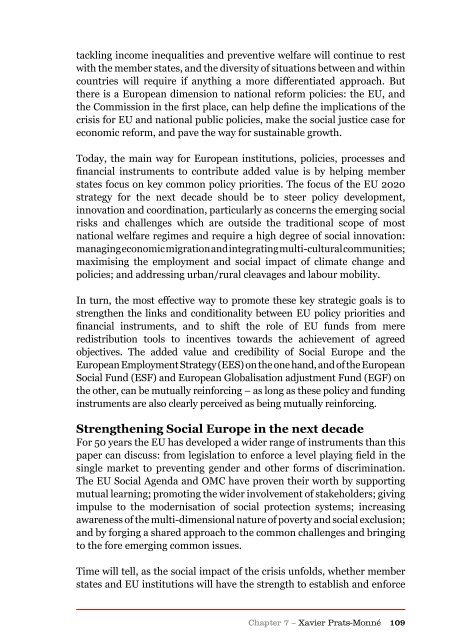Authors Iain Begg | Gabriel Glöckler | Anke Hassel ... - The Europaeum
Authors Iain Begg | Gabriel Glöckler | Anke Hassel ... - The Europaeum
Authors Iain Begg | Gabriel Glöckler | Anke Hassel ... - The Europaeum
Create successful ePaper yourself
Turn your PDF publications into a flip-book with our unique Google optimized e-Paper software.
tackling income inequalities and preventive welfare will continue to rest<br />
with the member states, and the diversity of situations between and within<br />
countries will require if anything a more differentiated approach. But<br />
there is a European dimension to national reform policies: the EU, and<br />
the Commission in the first place, can help define the implications of the<br />
crisis for EU and national public policies, make the social justice case for<br />
economic reform, and pave the way for sustainable growth.<br />
Today, the main way for European institutions, policies, processes and<br />
financial instruments to contribute added value is by helping member<br />
states focus on key common policy priorities. <strong>The</strong> focus of the EU 2020<br />
strategy for the next decade should be to steer policy development,<br />
innovation and coordination, particularly as concerns the emerging social<br />
risks and challenges which are outside the traditional scope of most<br />
national welfare regimes and require a high degree of social innovation:<br />
managing economic migration and integrating multi-cultural communities;<br />
maximising the employment and social impact of climate change and<br />
policies; and addressing urban/rural cleavages and labour mobility.<br />
In turn, the most effective way to promote these key strategic goals is to<br />
strengthen the links and conditionality between EU policy priorities and<br />
financial instruments, and to shift the role of EU funds from mere<br />
redistribution tools to incentives towards the achievement of agreed<br />
objectives. <strong>The</strong> added value and credibility of Social Europe and the<br />
European Employment Strategy (EES) on the one hand, and of the European<br />
Social Fund (ESF) and European Globalisation adjustment Fund (EGF) on<br />
the other, can be mutually reinforcing – as long as these policy and funding<br />
instruments are also clearly perceived as being mutually reinforcing.<br />
Strengthening Social Europe in the next decade<br />
For 50 years the EU has developed a wider range of instruments than this<br />
paper can discuss: from legislation to enforce a level playing field in the<br />
single market to preventing gender and other forms of discrimination.<br />
<strong>The</strong> EU Social Agenda and OMC have proven their worth by supporting<br />
mutual learning; promoting the wider involvement of stakeholders; giving<br />
impulse to the modernisation of social protection systems; increasing<br />
awareness of the multi-dimensional nature of poverty and social exclusion;<br />
and by forging a shared approach to the common challenges and bringing<br />
to the fore emerging common issues.<br />
Time will tell, as the social impact of the crisis unfolds, whether member<br />
states and EU institutions will have the strength to establish and enforce<br />
Chapter 7 – Xavier Prats-Monné 109

















